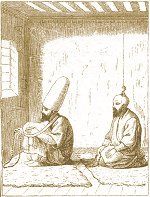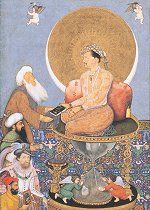Serving the Guest: A Sufi Cookbook
Essays | Recipes | Gallery

For the Sufi, observance of adab forges links with a spiritual heritage. The extension of hospitality and sharing of meals offer opportunities to embody remembrance of God within traditions shared by generations of fellow travelers on the path.
Most early Sufis were well-known for their asceticism, both individually and in community. The early Sufi mystic and martyr Mansur al-Hallaj was said to have survived for seven years on a diet of bread and salt. The Chishti shaikh Baba Fariduddin Masud frequently observed fasts, his iftar (fast-breaking meal) no more than a cup of syrup, at least half of which he would distribute among his companions. One 10th century traveler wrote of groups of Sufis whose only food was acorns split, sweetened, ground and mixed with wild barley. Qadiris of 17th century Sudan were known to subsist on nothing more than dates and acacia pods during retreats lasting three months or more.
Fasting is an essential Sufi practice, particularly in the context of the chille, the traditional forty-day retreat undertaken by initiates in many orders. However, such fasting does not involve total deprivation. In order to awaken subtle faculties, to reduce distraction, and to redirect the priorities of those on retreat, it often has been thought better to take a small amount of simple food rather than none at all.

by throwing a morsel into it.
Whether fasting or not, Sufis have long been advised to eat in moderation.
The seeker after truth should eat bread that is earned honestly by lawful means. He should eat just enough to help him to sustain himself and discharge his duties both towards his fellowmen and towards God. But he should never gratify himself to the maximum. The food must be simple. Since the appetites and passions are the natural propensities of nature, they cannot be uprooted; but the seeker after truth should, in the beginning, attempt to do so, so that he may come to achieve moderation. The secret of abstinence lies in gaining mastery over nature; when this is attained, further restraint is superfluous.
Austerity is not always called for, however, especially when guests arrive. In the late 10th and early 11th centuries CE, Abu Sa'id ibn Abil'Khayr engaged in extreme self-mortifications, and eventually alienated many of his companions. At the age of forty he experienced a spiritual transformation, and thereafter was renowned and controversial for his humor, generosity, joy, gratitude and girth. At Abu Sa'id's khanqah (Sufi center), food was served twice a day; the doors were open to all, without question. He is said to have prayed every night that God would give his disciples something good to eat. When there was no money, Abi'l Khayr and his disciples went hungry; when there was money, he spent it all on sumptuous feasts. In this way he cultivated detachment from both desire for food, and from identification with renunciation.

but God is far aloof from them both,
and a dervish is dead to all stations and free from all states.
Abi'l Khayr established rules for his fraternity — one of the earliest Sufi brotherhoods — that were the foundation of later codes of dervish adab. Among them were that dervishes were never to eat alone, were to welcome anyone who joined their company, serve them with pleasure and patience, and offer even the smallest morsel of food to any person hungrier than themselves.
Many early Sufis trod a middle path, neither ascetic nor extravagant. Such was Junayd of Baghdad, who was known for his moderation and generosity. His house was a center where Sufis held meetings and often stayed as guests. When Shaikh of Khorasan came to Baghdad with eight dervishes, Junayd lodged them in his home for a full year, offering them every day fresh food, new clothes and perfumes.
When asked "What is worship?," Muinuddin Chishti, founder of the Chishti Order, responded,
Muinuddin became legendary for his embodiment of this philosophy. It is said that so many meals were cooked every day in his kitchen that every impoverished person in the whole city could eat until satisfied. His custom was continued by his successors — any surplus at Chishti khanqahs was distributed to visitors and the needy. In emulation of their Shaikh, the Chishtis take to heart the hadith, "If someone visits a living man and gets nothing from him to eat, it is as if he had visited the dead."

Bahauddin Naqshband, pir of the Naqshbandi Order, was so assiduous about the obligation to accept invitations that one Ramadan he is said to have agreed to share the fast-breaking meal, known in Arabic as iftar, with forty different friends — and to have been present at each of their gatherings. Though his disciples could hardly hope to reenact this legendary feat, they continue to be inspired by his example, set over six hundred years ago.
The Shadhiliyya Shaikh 'Abd al-Wahhab ibn Ahmad ash-Sharani ran a thriving zawiya (North African Sufi center) in Cairo during the 16th century. He, too, took great pleasure in generosity, and regarded as one of the blessings of Allah the fact that so many people were able to enjoy so much good food at his establishment during Ramadan, 'Id (the Islamic New Year), and other festivals.
The 18th century Shadhiliya shaikhs of the Sudan were renowned for their generosity and graciousness, and regarded these qualities as the epitome of spiritual aspiration. Their schools, called khalwas, were centers of hospitality to visitors, travelers and traders. The khalwa of Shadhiliya Shaikhs Idris al-Arbab and his son Hamad served a total of one hundred eighty meals every day of the year, and distributed to the poor all of the gifts that were received. When a scholar visited the khalwa and asked Shaikh Idris the ultimate goal of the Sufi's quest, the Shaikh brought him into the kitchen As they watched the women, servants and dervishes preparing sorghum pancakes for the guests, the Shaikh answered, "By God and by His Messenger, I have no name other than this dough!" Another shaikh, Hasan wad Hasuna, was also known for the feasts he would offer; he himself, however, ate bitter acacia pods with water as his guests enjoyed the more substantial food.
If one understands the inner significance of one's actions, observance of the sunna and adab may help to cultivate an environment full of remembrance of God and of the unity of the manifest and the hidden levels of existence. From it grows the prayer:

from Serving the Guest: A Sufi Cookbook
Copyright © 1999, 2000 by Kathleen Seidel
Sources of previously published material by other authors used by permission, and print sources for images, may be found at http://www.superluminal.com/cookbook.